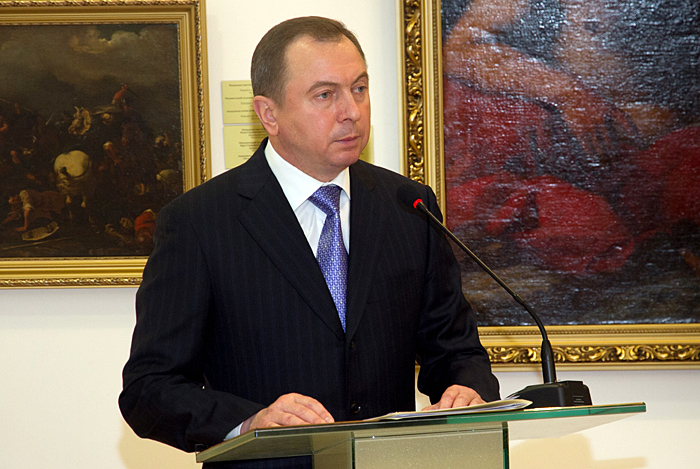
Belarus’s Multi-Directional Foreign Policy Versus the Zero-Sum Fallacy
Publication: Eurasia Daily Monitor Volume: 12 Issue: 102
By:

At the May 21–22 Riga summit of the European Union’s Eastern Partnership (EaP), Belarus was represented by Foreign Minister Vladimir Makei. Nothing groundbreaking was achieved at Riga with regard to Belarus. The country refused to sign the summit declaration’s first version, which had condemned Russia for its “illegal annexation” of Crimea. The phrase was later replaced by “actions against Ukraine” and Minsk offered its support for this version. However, an addendum was attached to the final joint declaration, emphasizing that Belarus does not accept some paragraphs of that document that expressed a confrontational attitude toward certain third countries (i.e. Russia) (Tut.by, May 22).
Elena Kupchina, Belarus’s deputy foreign minister responsible for Minsk’s ties with Europe, warned in advance that if anti-Russian themes were emphasized during the upcoming EaP summit, it could well become the last one that Belarus attends (TASS, May 5). Nonetheless, prior to the summit, there was no shortage of the EU’s courting of Belarus. Donald Tusk who chairs the European Council was particularly active in this regard. In particular, he called Belarus a “responsible and predictable partner as far as the conflict between Russia and Ukraine is concerned.” He also acknowledged that his phone conversation with President Alyaksandr Lukashenka immediately after the annexation of Crimea by Russia (Tusk then served as Poland’s prime minister) was a “pleasant surprise.” “I saw,” Tusk added “that Belarus is genuinely independent and neutral on that issue.” Tusk welcomed what he called “a new type of relationship between the EU and Belarus in areas of world order and geopolitics in our part of the continent.” Moreover, “if positive signals [from Minsk] continue, I am ready to undertake a set of unusual reciprocal steps,” concluded Tusk. Referring to the European Council president’s observation that the human rights situation is least favorable in Belarus and Azerbaijan, a Belarusian journalist asked why the EU treats these countries so differently—whereby there are sanctions against Belarus but not against Azerbaijan. “This is a good question,” replied Tusk, “and I do not have a good answer to it” (Tut.by, May 20).
Although Tusk at least declined to muddle this issue—something done endlessly by numerous Eurocrats before him—filling in the blanks might still be instructive. What indeed would a “good answer” to the aforementioned question invoke? Most probably, it would invoke oil in Azerbaijan and a zero-sum game approach to Belarus. Practiced most emphatically by Russia, such a policy course has been embraced by the EU as well. Along the same lines, a putative good answer might bring up the almost forgotten GUAM, an alliance of Georgia, Ukraine, Azerbaijan and Moldova, to which Turkey and Latvia have observer status. GUAM held its last heads-of-state summit in 2008, in Batumi, Georgia, one month prior to the August Russia-Georgia war. A quick glance at the map would reveal that in terms of its spatial configuration, GUAM had an obvious missing link, a lacuna whose name is Belarus. GUAM was being nurtured in some corridors of power throughout 1996, which is when Belarus was first slammed with sanctions. Evidently, this point was not lost on President Lukashenka. Referring to the EU’s Eastern Partnership, which Belarus was invited to join in 2009, Lukashenka exclaimed “What would this partnership be without Belarus? It would be the infamous GUAM!” (Naviny.by, July 17, 2010).
It is amazing how symmetric the de facto geopolitical thinking has become on both sides of the growing divide in Europe. Thus, during a public national security roundtable, on May 22, Yury Shevtsov, a well-connected analyst, suggested that Belarus’s geopolitical situation today is unique in the sense that it allows Belarus to “prevent the coalescence of two anti-Russian hearths”—i.e., that in the Baltic States and that in Ukraine. He continued, “Only [Belarus] stands in the way of the conflict between the West and Russia becoming totally unmanageable. If we lose control over our country, these two hearths would merge, and the international consequences of that merger would go beyond the Cold War situation. So a new geopolitical function of our country is [to prevent this from happening]. And in addition to that, we are assuming some of the erstwhile geopolitical functions of Ukraine. In particular we have turned out to be the only reliable land bridge between the EU and Russia” (Belarus Segodnya, May 22).
So while for Western strategists, Belarus’s geopolitical reorientation would allow spatial continuity for some sort of a cordon sanitaire along the border with Russia, for Russia itself and for some strategists in Belarus, it is precisely this outcome that they see as dangerous. In Shevtsov’s judgment, not only should Belarus prevent the West from closing the gap between the two “anti-Russia hearths,” it should also prevent Russia from devolving into nationalist political radicalization. He urged the Belarusian state to undertake a “more robust information policy in the context of ‘big Russia’ ” (a term somewhat synonymous with the “Russian world”). “We built up experience in that sort of policy when we used the image of our president, of our social welfare state, and of Belarus as a manicured and clean country without oligarchs. We should redouble our effort” at that sort of policy, Shevtsov concluded (Belarus Segodnya, May 23).
One can, therefore, increasingly perceive a parallel between Belarus’s long touted stability and its multi-vector (i.e. multi-directional) foreign policy. Stability has recently transformed from what seemed to be a mere propaganda cliché propagated by the government in Minsk into a palpable reality treasured by ordinary Belarusians. The Belarusian population is keenly aware of the conflict raging next door, as are those responsible international actors interested in bringing that conflict to an end. Hence, the expediency of Minsk making friends on both sides of the divide, in Russia and in the West—once seen as an artifice—is now gaining acceptance as an objective necessity and an asset of Belarus. Indeed, that is what Foreign Minister Makei’s May 19 interview to the Washington Post was largely about (Mfa.gov.by, May 24).




